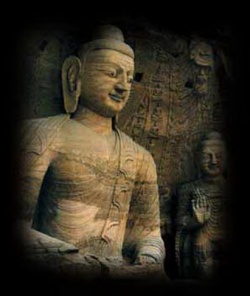Difference between revisions of "Five sundry practices"
m (Text replace - "1" to "1") |
|||
| Line 7: | Line 7: | ||
They are | They are | ||
| − | (1) to read and recite any [[sutra]] other than the three [[Pure Land]] [[sutras]] (the [[Buddha]] [[Infinite]] [[Life]], [[Meditation]] on the [[Buddha]] [[Infinite]] [[Life]], and [[Amida]] [[sutras]]), | + | ([[1]]) to read and recite any [[sutra]] other than the three [[Pure Land]] [[sutras]] (the [[Buddha]] [[Infinite]] [[Life]], [[Meditation]] on the [[Buddha]] [[Infinite]] [[Life]], and [[Amida]] [[sutras]]), |
(2) to [[meditate]] on any [[Buddha]] other than [[Amida]], | (2) to [[meditate]] on any [[Buddha]] other than [[Amida]], | ||
(3) to worship any [[Buddha]] other than [[Amida]], | (3) to worship any [[Buddha]] other than [[Amida]], | ||
| − | (4) to call on the name of any [[Buddha]] other than [[Amida]], and | + | (4) to call on the [[name]] of any [[Buddha]] other than [[Amida]], and |
(5) to praise and give [[offerings]] to any [[Buddha]] other than [[Amida]]. | (5) to praise and give [[offerings]] to any [[Buddha]] other than [[Amida]]. | ||
Revision as of 01:13, 11 September 2013
five sundry practices
[五種の雑行] (Jpn goshu-no-zogyo )
Also, five kinds of sundry practices. The Pure Land school regards these practices as preventing rebirth in Amida's Pure Land. Based on Shan-tao's Commentary on the Meditation on the Buddha Infinite Life Sutra, Honen (1133-1212), the founder of the Japanese Pure Land (Jodo) school, explained them in his work The Nembutsu Chosen above All.
They are
(1) to read and recite any sutra other than the three Pure Land sutras (the Buddha Infinite Life, Meditation on the Buddha Infinite Life, and Amida sutras),
(2) to meditate on any Buddha other than Amida,
(3) to worship any Buddha other than Amida,
(4) to call on the name of any Buddha other than Amida, and
(5) to praise and give offerings to any Buddha other than Amida.
The five sundry practices are contrasted with the five correct practices, which are directed toward Amida Buddha.
See also five correct practices
